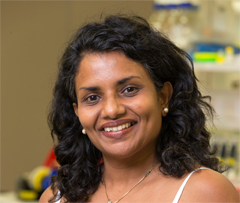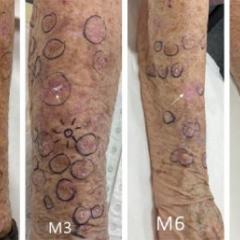 The University of Queensland has received a major funding boost to its development of a saliva test to diagnose the early stages of head and neck cancer linked to Human Papillomavirus (HPV).
The University of Queensland has received a major funding boost to its development of a saliva test to diagnose the early stages of head and neck cancer linked to Human Papillomavirus (HPV).
UQ’s Diamantina Institute and Smart Futures Senior Research Fellow Dr Chamindie Punyadeera has received a three-year $300,000 grant from The Garnett Passe and Rodney Williams Memorial Foundation for the research.
Dr Punyadeera aims to reduce the mortality, morbidity, and expense linked to HPV-associated head and neck cancer by providing a non-invasive and low-cost saliva test as an effective early diagnosis tool for high-risk groups whom include young men and women engaging in oral intercourse and women who have or have had cervical cancer.
“The two predominant causes of head and neck cancer are smoking and the human papilloma virus (HPV), which is transmitted through sexual contact,” Dr Punyadeera said.
“While the percentage of head and neck cancer caused by smoking is on the decline due to a simultaneous decrease in tobacco use, the incidence of HPV associated cancer is on the rise.
“There are no early detection and or screening methods to diagnose HPV associated head and neck cancer in high-risk population groups.
“My research aims to determine the feasibility of using saliva to diagnose high-risk HPV genotypes in head and neck cancer patients.”
Dr Punyadeera is collaborating on the project with Professor Ian Frazer, CEO of the Translational Research Institute (TRI) and Dr Duncan Lambie from The University of Queensland.
Once developed, Dr Punyadeera will then determine the likelihood of using this test to identify people at a high risk of developing HPV associated head and neck cancer.
The treatment options for head and neck cancer patients are surgery, radiotherapy and or chemotherapy, and treatments are costly as well as debilitating.
One head and neck patient’s radiotherapy costs $780 a day and 30 days of treatment equates to $23,400, which is in addition to major surgery, hospitalisation and potentially a range of other costs.
“The development of early diagnostics will one day enable us to render targeted therapy, significantly reducing mortality and morbidity associated with head and neck cancer,” she said.
Dr Punyadeera has a close personal interest in finding a solution for this type of cancer.
“I lost my brother-in-law to cancer. He was diagnosed with lung cancer in November 2005 and he passed away in March 2006,” Dr Punyadeera said.
“I have seen how he deteriorated during this time and at the point of diagnosis his cancer had metastasized into other parts of the body.
“This is a strong motivation for me to develop diagnostic biomarkers to detect smoking-associated cancers.”
Head and neck cancer is the sixth most common cancer in the world with 900,000 cases diagnosed worldwide.
The Garnett Passe and Rodney Williams Memorial Foundation
The Garnett Passe and Rodney Williams Memorial Foundation was established by the late Mrs Barbara Williams to honour the memory of her two husbands, Garnett Passe and Rodney Williams.
The Foundation became operative upon the death of Mrs Williams on 16 September 1991, with one of the largest bequests ever made to Australian medicine and one of the largest to Otorhinolaryngology in the world.
The trust deed provides the trustees with wide powers of investment and discretion to apply the income in perpetuity exclusively for charitable, scientific and educational purposes, particularly the advancement of the Specialty of Otorhinolaryngology and the related medical, surgical and paramedical fields in Australia and other countries.



